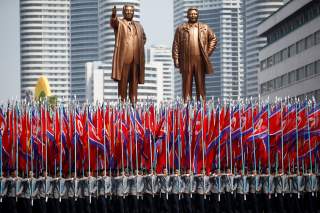Is Regime Change Still an Option for North Korea and Iran?
The Trump administration deserves credit for refraining from following a “one shoe fits all” policy toward regime change in Pyongyang.
Even if the adversary is unable to discern U.S. intentions, however, that opponent may hold a variety of tools. Regarding Iran, it might resume harassment of U.S. naval forces in the Persian Gulf and even try to seize U.S. Navy boats as Iran did in 2016. The Islamic Revolutionary Guard Corps might revert to its use of proxies to strike U.S. forces and bases. Major Omer Carmi, on leave from the Israel Defense Forces and now at the Washington Institute for Near East Policy, states that “such [usage] . . . would enable Tehran to make good on its threats while preserving deniability and avoiding escalation with the United States.”
The Way Forward
First, refrain from a “one size fits all” approach, because it might lead to disaster. Also, keeping an adversary guessing does not preclude an opponent from taking military actions that are hard to counter; remember the goose and the gander!
Second, heed Tillerson’s words, “Washington would work with Iranian opposition groups toward the ‘peaceful transition of that government.’” Other members of Team Trump should repeat those words often to remind the Iranian regime options other than open war or dead-end diplomacy exist.
Third, the Trump team should signal its willingness to, at a minimum, meet with and listen to Iranians who reject clerical rule and seek to bring about regime change from within Iran; regarding North Korea, the stick of tough multilateral UN sanctions and carrot of unilateral conversations are elements for bargain. But forget about changing Pyongyang from within. That said, if Kim Jong-un agrees to negotiate away his ballistic missiles and nuclear weapons for a multilateral guarantee of regime security, then perhaps Trump should consider such a deal.
Raymond Tanter served as a senior member on the National Security Council staff in the Reagan-Bush administration and is now Professor Emeritus at the University of Michigan. You can follow him @AmericanCHR.
Edward Stafford is a retired foreign-service officer; he served in Political-Military Affairs at the State Department, as a diplomat with the U.S. Embassy in Turkey and taught at the Inter-American Defense College. You can follow him @egstafford.

